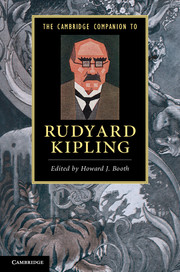Book contents
- Frontmatter
- Introduction
- 1 Kipling and the fin-de-siécle
- 2 India and empire
- 3 Kipling’s very special relationship: Kipling in America, America in Kipling
- 4 Science and technology
- 5 Kipling and gender
- 6 Kipling and war
- 7 Kipling as a children's writer and the Jungle Books
- 8 'Nine and sixty ways’: Kipling, ventriloquist poet
- 9 Kim
- 10 The later short fiction
- 11 Kipling and postcolonial literature
- 12 Kipling and the visual: illustrations and adaptations
- 13 Reading Kipling in India
- Further reading
- Index
4 - Science and technology
Published online by Cambridge University Press: 28 September 2011
- Frontmatter
- Introduction
- 1 Kipling and the fin-de-siécle
- 2 India and empire
- 3 Kipling’s very special relationship: Kipling in America, America in Kipling
- 4 Science and technology
- 5 Kipling and gender
- 6 Kipling and war
- 7 Kipling as a children's writer and the Jungle Books
- 8 'Nine and sixty ways’: Kipling, ventriloquist poet
- 9 Kim
- 10 The later short fiction
- 11 Kipling and postcolonial literature
- 12 Kipling and the visual: illustrations and adaptations
- 13 Reading Kipling in India
- Further reading
- Index
Summary
Despite the contemporary enthusiasm for sanitary reform, few Victorians wrote poems about drains. One exception was Kipling, who gave his poem the daringly unpromising title 'Municipal'. The speaker is a district commissioner who, when menaced by a stampeding elephant, took refuge in a blocked-up outfall wearing regulation 'snowy garments':
You may hold with surface-drainage, and the sun-for-garbage cure,
Till you've been a periwinkle shrinking coyly up a sewer.
The experience has made him 'believe in well-flushed culverts' and, as a result, the death-rate in his district has gone down. Kipling's vision of empire extended to the infrastructure of railways, riverboats, bridges and sewage systems. In his prose and poetry, his fascination with technology and its consequences shows up in unexpected places, foreign, imperial and domestic. On his visit to Brazil in 1927, he sent rapturous dispatches to the ultra-conservative (and often xenophobic) Morning Post praising the mountain railways, the giant hydroelectric installations, and the laboratory where snakes and spiders were milked for their venom. ‘“They” ’ heads towards the mystical and redemptive, but it starts by evoking the joys of motoring through rural England, and does not stint on technical details: ‘I was on the point of reversing and working my way back on the second speed.’
- Type
- Chapter
- Information
- The Cambridge Companion to Rudyard Kipling , pp. 52 - 65Publisher: Cambridge University PressPrint publication year: 2011



